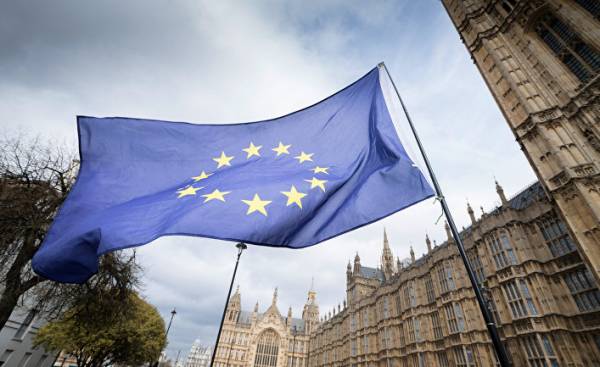
Member countries of the EU unanimously approved a tough package of requirements to the UK ahead of talks on Brexia. The document was approved on April 29 at an emergency summit in Brussels in just four minutes. Thus, the members of the European Union demonstrated rare unanimity, showing London that all attempts to drive a wedge into the ranks of the Europeans are useless. The main requirement of the EU without resolving all disputed issues to the discussion of a new Treaty impossible. This is the fundamental point, as Prime Minister of the United Kingdom Theresa may wanted to run two parallel negotiations — on Brexia and future trade agreement. Reaction of official London to the summit of the EU was negative. The Minister for exit from the European Union David Davis called the rate of Europeans “confrontational”, repeating a recent statement by Theresa may that “members of the EU are United against the UK.”
According to European observers, the summit presented three lessons. First, Europe has demonstrated a hitherto unknown unity. Second, the 27 EU member States confirmed that the next stage (generation of trade agreements) will not begin so soon as was hoped Theresa may, and only after London will pay a high price. And, thirdly, Pexit could give impetus to a new stage of European integration the Europe of several speeds.
In the course of the upcoming talks will discuss three main issues: protecting the rights of EU citizens in the UK, the bill, which should pay London for an exit from the EU, and the situation in Northern Ireland, which has a land border with the Irish Republic — a member of the EU. In addition, the agenda will be the transfer from London two European institutions: the European Agency of medicines, which is already claimed by Barcelona and Vienna, and the European banking authority, which is also a lot of applicants, including Luxembourg. Agency, each of which runs to thousands of employees, are obliged to leave London after Breccia, and it will be a severe blow to the British capital.
Not the first stage of “divorce process” key will be the question of money. London will be forced to pay the amount to 60 billion euros. But the Europeans will not be easy: Britain was the second net donor to the EU after Germany, and an annual budget hole of 10 billion euros need to be filled. While the main burden will fall on the rich countries — Germany, the Netherlands, Denmark and Sweden. Although German Finance Minister Wolfgang Schaeuble said that his country won’t pay a single extra Euro, few believe in it.
Another priority issue is the protection of the rights of EU citizens in the UK. It is estimated that 3 million of EU citizens living, studying and working in the UK, and about 1 million Brits in EU countries. The European Union demanded that Theresa may, immediately gave a “serious and real” guarantee to EU citizens living in the UK.
The Irish question is the most difficult from a political point of view. In the case of Breccia Northern Ireland have separate fortified border. In this regard, the Prime Minister of the Republic of Ireland ENDA Kenny called on the EU to support the Union with Northern Ireland (according to the principle of German unification) to a single country remained a member of the European Union. This issue can also be included in the agenda of the upcoming talks. For nationalist circles in London the subject of Irish unification, and the status of Gibraltar, it is extremely painful. But for Northern Ireland may be followed by Scotland, the majority of citizens who want to remain in the EU.
On June 8, Theresa may, intends to hold an early parliamentary election to strengthen its position within the UK. But, as noted by the leaders of the EU, will not affect the position of the Europeans Bracito. And the Prime Minister of Malta Joseph Muscat has just said that these elections — the loss of extra months for the negotiation process. The process of Breccia is expected to be completed in 2019, however, many observers believe that the solution to all problems will take much more time: the probability to stay within 2 years is less than 50%. Meanwhile, the prospects for the British economy worsens, investors are worried. Economic growth this year slowed to 0.3%, there is concern that on the eve of Breccia banks in a mass order will start to leave the city of London. Angela Merkel warned Britain that she had no illusions about the future relations with the EU: the former privileges will be gone.
During last year’s referendum 52% of Britons voted to secede from the EU, 48% are in favour of continued membership. For Pexit England spoke of “yesterday”: a province, a retired, depressed regions, workers, small shopkeepers. For EU — cities, youth, representatives of modern professions. The initiators of the referendum are not counted until the end of all economic and geopolitical risks: the probability of separation from great Britain, Scotland and Northern Ireland. Empire, which has been collected for centuries may be finally lost as a result of one fatal flaw. Easy to understand “backward” citizens, who succumbed to nationalist feeling, but where we watched the famous English elite, which could block Brakcet at any stage? According to British analyst Simon Tilford, it also prevailed the old Imperial pride, unwillingness to be in a big European team, which is dominated by the Franco-German tandem.







